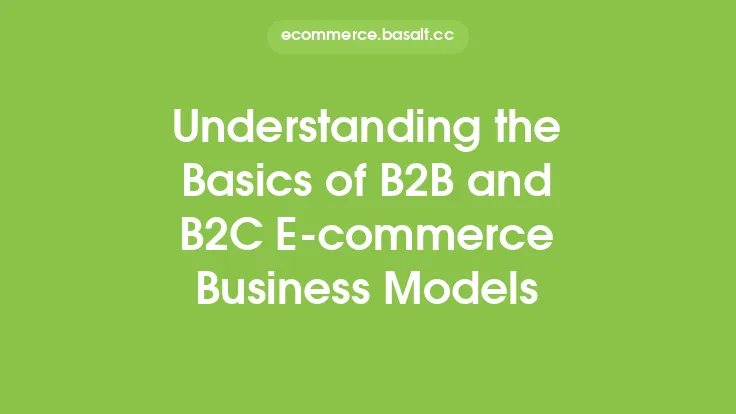The e-commerce landscape has undergone significant transformations over the years, with the rise of various business models catering to diverse consumer needs. One such model that has gained prominence is the niche market approach, where businesses focus on targeting specific audiences and products. This strategy allows e-commerce companies to differentiate themselves from larger, more generalized retailers and establish a strong presence in a particular market segment.
Understanding Niche Markets
Niche markets refer to specific segments of the consumer market that have unique needs, preferences, or characteristics. These markets are often smaller and more specialized than broader markets, requiring a tailored approach to effectively target and serve them. Niche markets can be defined by various factors, including demographics, interests, behaviors, or geographic locations. For instance, a niche market might consist of outdoor enthusiasts, pet owners, or individuals with specific dietary requirements.
Benefits of Targeting Niche Markets
Targeting niche markets offers several benefits for e-commerce businesses. Firstly, it allows companies to focus on a specific audience, developing a deeper understanding of their needs and preferences. This, in turn, enables businesses to create targeted marketing campaigns, product offerings, and customer experiences that resonate with their target audience. Secondly, niche markets often have less competition, providing businesses with an opportunity to establish themselves as authorities and build strong brand loyalty. Finally, targeting niche markets can be more cost-effective than attempting to appeal to a broader audience, as marketing efforts can be more focused and efficient.
Identifying Profitable Niche Markets
Identifying profitable niche markets is crucial for the success of an e-commerce business. Several factors should be considered when evaluating potential niche markets, including market size, growth potential, competition, and consumer demand. Businesses can use various tools and techniques, such as keyword research, social media listening, and customer surveys, to identify niche markets that align with their products and services. Additionally, analyzing consumer trends, preferences, and pain points can help businesses uncover opportunities to create targeted solutions that meet specific needs.
Creating Effective Niche Market Strategies
Creating effective niche market strategies requires a deep understanding of the target audience and their needs. Businesses should develop buyer personas, which are detailed profiles of their ideal customers, to guide their marketing efforts and product development. A niche market strategy should also include targeted marketing campaigns, such as social media advertising, email marketing, and influencer partnerships, to reach and engage with the target audience. Furthermore, businesses should focus on creating high-quality, relevant content that addresses the specific needs and interests of their niche market, establishing themselves as authorities and building trust with their target audience.
Product Selection and Development
Product selection and development are critical components of a niche market strategy. Businesses should carefully curate their product offerings to ensure they meet the specific needs and preferences of their target audience. This may involve partnering with suppliers who specialize in niche products or developing proprietary products that address specific needs. Additionally, businesses should prioritize product quality, ensuring that their offerings meet the highest standards of quality, functionality, and design. By focusing on niche products, businesses can differentiate themselves from larger retailers and establish a strong reputation within their target market.
Building Strong Relationships with Niche Market Customers
Building strong relationships with niche market customers is essential for long-term success. Businesses should prioritize customer service, ensuring that their target audience receives personalized support and attention. This can be achieved through various channels, including social media, email, and phone support. Additionally, businesses should focus on creating engaging customer experiences, such as loyalty programs, exclusive offers, and community-building initiatives, to foster loyalty and advocacy. By building strong relationships with their target audience, businesses can establish a loyal customer base and drive repeat business, positive word-of-mouth, and online reviews.
Measuring Success in Niche Markets
Measuring success in niche markets requires a nuanced approach, as traditional metrics may not be applicable. Businesses should track key performance indicators (KPIs) such as customer acquisition costs, customer retention rates, and average order value, to evaluate the effectiveness of their niche market strategy. Additionally, businesses should monitor social media engagement, email open rates, and customer feedback to gauge the sentiment and loyalty of their target audience. By tracking these metrics, businesses can refine their niche market strategy, making data-driven decisions to optimize their marketing efforts, product offerings, and customer experiences.
Conclusion
Targeting niche markets offers a compelling opportunity for e-commerce businesses to differentiate themselves, establish strong brand loyalty, and drive growth. By understanding the unique needs and preferences of specific audiences, businesses can create targeted marketing campaigns, product offerings, and customer experiences that resonate with their target market. As the e-commerce landscape continues to evolve, businesses that focus on niche markets will be well-positioned to succeed, establishing themselves as authorities and building strong relationships with their target audience. By prioritizing niche market strategies, businesses can unlock new revenue streams, drive customer loyalty, and achieve long-term success in the competitive e-commerce landscape.





